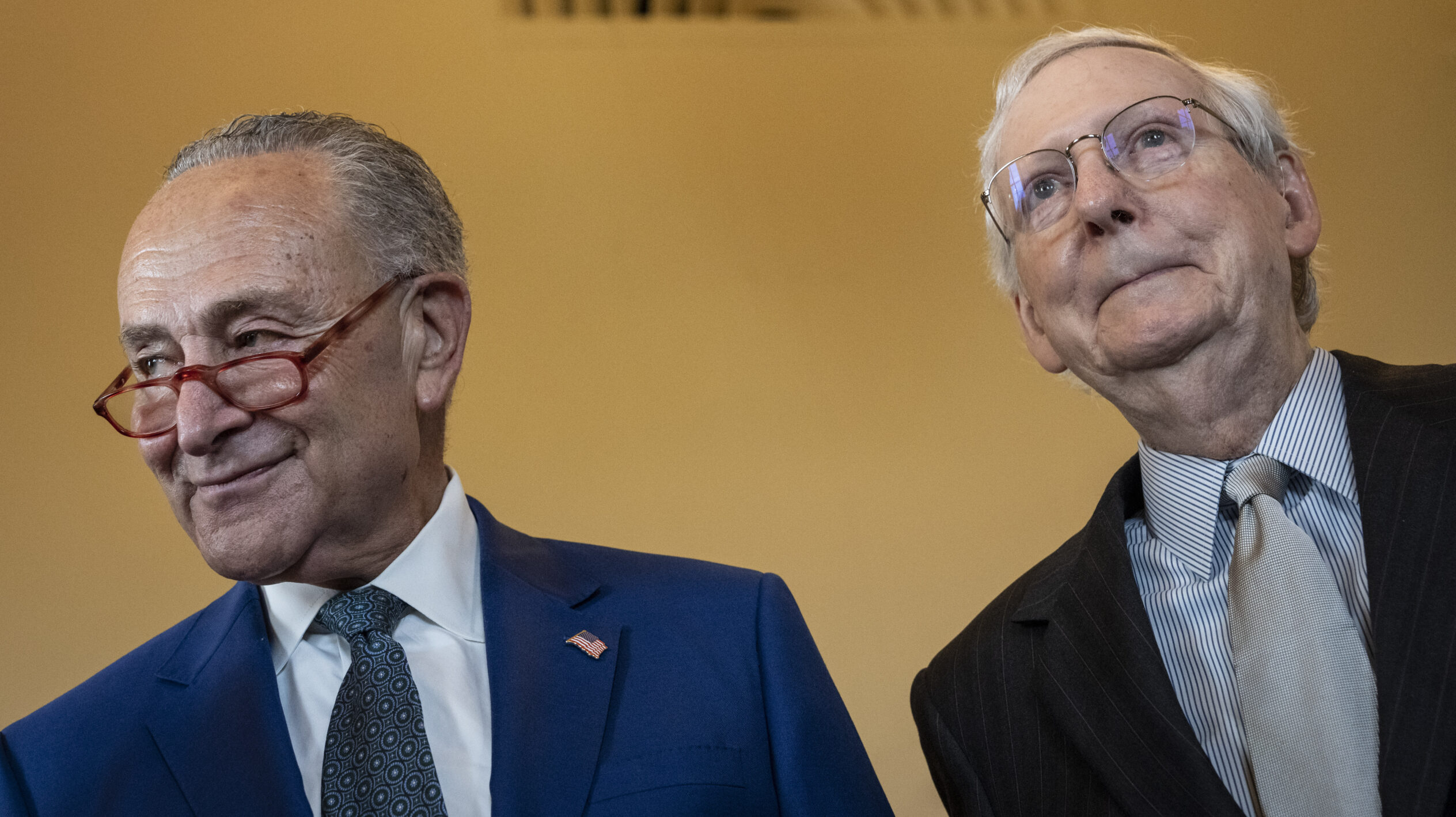
Senate Majority Leader Chuck Schumer (D-NY) and Senate Minority Leader Mitch McConnell (R-KY) stand for a photo before a meeting with Italian Prime Minister Giorgia Meloni at the U.S. Capitol July 27, 2023 in Washington, DC. (Photo by Drew Angerer/Getty Images)
WASHINGTON — The Senate tonight passed its version of the Fiscal Year 2024 National Defense Authorization Act with a vote of 86 to 11, largely ducking the contentious culture war issues that enveloped much of the final debates that took place earlier this month in the House.
With each chamber having passed their respective bills, House and Senate leadership will now designate members to act as conferees, where the Republican-controlled House and Democrat-controlled Senate will attempt to hash out a mutually agreeable bill behind closed doors. Once that is done, each chamber must successfully pass the conference version of the legislation before it can be sent to President Joe Biden’s desk for a final signature.
On Thursday evening in the hours before the Senate passed its legislation, the White House sent out a statement re-iterating its longstanding objections to the bill’s inclusion of funding for a nuclear-armed sea launch cruise missile as well as prohibitions on the Navy’s ability to decommission certain ships.
The White House also said it opposes the Senate bill’s requirement for the service to maintain a minimum of 24 amphibious warships available for worldwide deployment on a given day.
“Maintaining more than 77 percent of a 31-ship amphibious force for potential operational availability would require delaying other necessary maintenance, modernization, and repair activities, resulting in fewer and less capable ships ready for operational tasking and severely limiting options to maintain and improve the force,” the White House said.
The Senate Armed Services Committee’s base version of the prospective FY24 NDAA advanced out of committee in June in an overwhelmingly bipartisan vote, 24-1. Its topline funding number for national security spending came in at $886 billion, matching the deal struck in May between congressional leaders and the White House.
Between this week and last, the upper chamber voted on amendments on topics ranging from preventing the president from unilaterally withdrawing from NATO (which was adopted, 65-28) to establishing an inspector general’s office to oversee aid sent to Ukraine (not adopted, 51-48). Senate rules dictate each amendment achieve at least 60 votes to win adoption, contrary to the House which only requires a simple majority.
Numerous other noncontroversial amendments proposed by Democrats and Republicans were passed using an expedited procedure referred to as a “manager’s package,” Senate Majority Leader Chuck Schumer, D-N.Y., said Thursday morning on the Senate floor.
Not seen on the Senate floor were more divisive issues that overwhelmed the last several hours of the House’s own amendments process, during which conservative lawmakers took aim at Pentagon abortion policies, funding for offices associated with diversity, equity and inclusion as well as the types of flags allowed to be flown on military bases. Despite those amendments, the House ultimately passed its defense policy bill with a vote of 219 to 210, with both Republicans and Democrats seeing a handful of members cross party lines for the final vote.
Also not seen during the Senate’s debate was a proposed vote on Pentagon abortion policies offered by Senate Democrats in exchange for Sen. Tommy Tuberville, R-Ala., relinquishing his longstanding effective hold on more than 200 senior military officer nominations.
Sen. Jack Reed, D-RI, and other Democrats, held the chamber’s floor for several hours on Wednesday night reading off the qualifications of each nominee to pressure Tuberville into releasing what Democrats say is a “profoundly insulting and damaging path.”
For his part, Tuberville has praised his recent discussions with Defense Secretary Lloyd Austin but has shown no appetite for ending his effective blockade until the Pentagon changes its policies.
Elsewhere on Capitol Hill, House appropriators published their initial draft of the next defense spending bill in June and Senate appropriators favorably voted their own spending bill out of committee on Thursday morning.





















